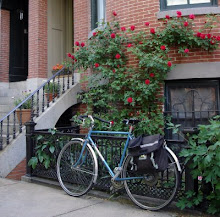How excited was I to see the Barclay's bikes all lined up by our hotel in London! I couldn't ride as much as I wanted because of the baby, but I did get two lovely rides in - one with my husband and one with my dad. I found riding on the left easier than driving on the left, perhaps because we were lane splitting and like a good dancer I just followed the car's lead.
The London system is identical to Boston's with the exception that the stations are installed to be year-round. I had my Hubway key with me, it was too bad I couldn't activate that to access the Barclay's bikes.
 |
| The only difference - look out for the LEFT hook! |




6 comments:
there's a similar Alta/Bixi bikeshare program in Melbourne (where vehicles also travel on the left side) but the system coverage is pretty limited and I wound up renting a Dutch bike from Humble Vintage to cover more of the city. I also found that staying on the proper side was easy when other vehicles were around and/or lane markings were present. Turning on empty side streets, though, I always found myself verging back to the right. Hard to break old habits.
Glad to see you still posting!
Hm, would it really be possible to activate your Hubway key? Are they reciprocal- like Zipcar? That would be good to know if I'm traveling somewhere that has an Alta-run system- and there are more and more of them coming (NYC)
It would be awesome to go to NYC or London and be able to pull out your bike share key and ride away.
cycler -- I imagine it would only work if there was actually some level of revenue sharing amongst all of the regional bikeshares. My impression is that Hubway, Capital, et al. are all local companies that license the technology from Alta/Bixi but are separate operations sponsored and supported by local city governments, unlike Zipcar, which is one company with regional offices.
You pay a membership fee to Zipcar and regardless of whether you live in Philly, Boston or Seattle, your fee goes into one revenue pool.
If you had key reciprocity without revenue sharing, then you could get into situations where, say, college students whose parents live in a city with a cheaper membership fee can use bikes in their school city without that city seeing any of the revenue that such usage would normally bring.
Though, I agree that it would be neat and would just make membership more attractive.
Oh Cris, I was thinking of it differently - I was thinking of it more like a driver's licence in that the key would afford me just a level of authenticity with their system - I would register my Boston key and pay whatever the London day or multi-day use would be, but I would get out of having to swipe my credit card twice(!) at every Barclay's stand, or enter 19 digits for a Velib' (not that they're the same system, but that typing is annoying). Thus they'd make the same money off of me, with less of a hassle to me and less paper for them.
I was curious about this, so I emailed Alta bike share, and they said that they currently don't do reciprocal rentals, but that they'll keep it in mind for future programs.
It's fairly common for museums, gardens, etc to have reciprocity agreements with other museums- on the theory that it's not a large percentage of visitors, and it kind of balances out. You could put limits on the "free" use of another system- 20 rides per year, or 10 days, or something like that if you were worried about serious revenue loss.
mmm ... that's an interesting idea, Charlotte. I think we're starting to see a lot more devices or tokens that are tied to a credit card or bank account and act as an transaction expediter. Probably the most common analogy is the EZPass system for electronic road toll collection. There are probably hurdles to come with internationalizing it (in web software, at least, there is no one vendor who can do true multi-denominational credit card clearing, one always winds up having to partner with local processing companies and all of their weird and specific requirements) but those can probably be surmounted with time and demand.
Post a Comment